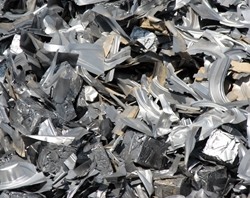What is scrap metal?
Tuesday, 23 February 2016

Put simply, scrap metal is the combination of waste metal, metallic material and any product that contains metal that is capable of being recycled from previous consumption or product manufacturing. Whether it’s vehicle parts, building supplies or surplus project materials, scrap has tremendous monetary value; so much so that the UK’s metal recycling industry is now worth upwards of £5.6 billion.
Scrap metal can originate from commercial and residential use. Whether it’s ferrous or non-ferrous metal, the processing of this into vital secondary raw material for the smelting of brand new metals is absolutely key.
These scrap metals have a high market value, with their ability to be re-used again and again. For instance, electricians might have wires and electrical equipment, plumbers are likely to have used copper piping and brass fixtures and even construction firms will have beam upon beam of steel that could be quite literally given a new lease of life.
But all too regularly these are tossed into the dump due to lack of knowledge and sources for metal recycling.
Determining non-ferrous and ferrous metals
Before recycling any metals, the first important step is to determine whether a metal is ferrous or non-ferrous. This is a very straightforward process and requires only a common magnet. If the magnet sticks to your metal, it is a ferrous metal. If the metal does not stick to your magnet it is a non-ferrous metal.
The most valuable scrap metals for recycling are non-ferrous; the most common of which are those that do not contain iron and are more resistant to corrosion, including copper, brass, aluminium, zinc, magnesium, tin, lead and nickel.
Ferrous metals are less valuable to metal recyclers but they will still recoup some value if you have enough of it. This includes metals such as steel and iron. Steel can be found in so many places; from cars to chairs, cabinets, shelving and more.
The most valuable non-ferrous metals for recycling
- Brass - Easily found on door handles, light fittings, keys and plumbing fixtures, brass is one of the most common yet in-demand non-ferrous metals. Often yellow in colour with a hint of red, brass is a combination of zinc and copper that can be extremely dense, increasing its value in pure weight alone.
- Aluminium - Yet another metal that’s often found in so many places around a regular home, aluminium can be recycled and re-used in an alternative guise within a matter of a months. Empty drinks and food cans are the most common places to find this metal, but areas such as guttering, siding, internal and external door and window frames are also good places to look. Aluminium is such an attractive metal for recyclers as the process saves 80 per cent of the energy that was used to make it in the first place.
- Copper - Another common metal regularly found in the structure of homes across the country, copper is also very valuable to recycle and very much in-demand at scrap yards. If the copper itself is in good condition it will be reddish in colour, but more worn copper fixtures and fittings will appear dark brown and sometimes green in places. It’s a versatile metal which means it is regularly used as plumbing pipes, as a roofing material for guttering, with common electric wires and even inside air conditioning units.
“No cash for scrap”
From 3rd December 2012, amendments to the Scrap Metal Dealers Act 1964 made it illegal to purchase scrap metal for cash sums in England and Wales; and this regulation remains in force under the Scrap Metal Dealers Act 2013.
It’s an offence for anyone to purchase scrap metal for cash or by any form of payment other than a crossed cheque or electronic money transfer.
So why recycle with ASM Metal Recycling?
Metal recycling helps to protect the wider environment and saves energy. The creation of secondary raw materials minimises the use of natural resources which would normally be required to make new metal compounds. That’s not to mention the many available savings in energy and reduced CO2 emissions, in production methods using recycled materials.
As proud members of the British Metals Recycling Association and the Road Haulage Association, we do everything by the book at ASM Metal Recycling. We use the very best technology to process ferrous and non-ferrous metals and guarantee total accuracy in our weighing and pricing. So the price we pay is the price you deserve.
If you would like to know more about what we do, take a look at our full range of metal recycling services today.
Recent posts
- What is commercial waste?
- What are different metals used for?
- What to do with radioactive scrap metal
- How does metal recycling benefit the economy and the environment?
- 5 common metals that can be recycled
- How does metal recycling work?
- How to Sort Metal for Scrap
- How to classify the different types of waste your business produces
- What is WEEE waste?
- Can iron be recycled in the UK?
- What has the most copper in it to scrap?
- How to better understand scrap metal pricing
- Is there a link between copper and brass prices?
- How to make money from cable scrap
- How many different types of copper are there?